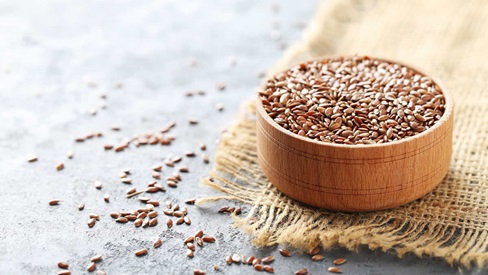Health Benefits of Flaxseeds: A Nutritional Powerhouse
Health Benefits of Flaxseeds: A Nutritional Powerhouse
Health Benefits of Flaxseeds: Flaxseeds, derived from the Linum usitatissimum plant, are small, nutrient-dense seeds packed with omega-3 fatty acids, dietary fiber, and essential plant compounds.

These seeds not only enhance the flavor of meals but also offer a wide range of health benefits.
Here’s an overview of their remarkable properties and simple ways to include them in your diet.
1. Nutrient-Rich Composition
Flaxseeds are loaded with essential nutrients that support overall health.
Per 1 tablespoon (~7 grams):
- Calories: 37
- Fiber: 2 grams (aids digestion and gut health)
- Omega-3 Fatty Acids (ALA): 1.8 grams (supports heart health)
- Protein: 1.3 grams
Key Micronutrients:
- Thiamine (Vitamin B1): 10% DV
- Copper: 9% DV
- Manganese: 8% DV
- Magnesium: 7% DV
2. Promotes Heart Health
- Omega-3 Fatty Acids: Flaxseeds are an excellent plant-based source of alpha-linolenic acid (ALA), which reduces inflammation, improves arterial function, and supports cardiovascular health.
- Cholesterol Regulation: Studies show flaxseeds can lower LDL (“bad”) cholesterol while raising HDL (“good”) cholesterol, enhancing heart health.
- Blood Pressure: Regular consumption helps reduce systolic and diastolic blood pressure, especially in people with hypertension.
3. Potential Cancer Prevention
Flaxseeds are among the richest sources of lignans, plant compounds with antioxidant properties. These lignans may:
- Inhibit tumor growth.
- Reduce cancer risk by modulating cell signaling pathways.
- Show promise in preventing breast, prostate, and colorectal cancers.
4. Improves Digestive Health
Flaxseeds are high in both soluble and insoluble fiber.
- Soluble fiber regulates blood sugar and lowers cholesterol.
- Insoluble Fiber: Adds bulk to stools, preventing constipation and promoting regular bowel movements.
5. Supports Blood Sugar Control
- The high soluble fiber content slows sugar absorption, stabilizing blood glucose levels.
- Flaxseeds can improve insulin sensitivity, making them beneficial for individuals with type 2 diabetes.
6. Assists in Weight Management
- Satiety: Dietary fiber promotes a feeling of fullness, helping control calorie intake.
- Steady Energy: Slower digestion stabilizes blood sugar levels, preventing energy crashes.
- Omega-3 Benefits: These fatty acids may boost metabolism and support fat loss.
7. Eases Menopausal Symptoms
Flaxseeds are a natural source of phytoestrogens, which mimic estrogen in the body. They may help alleviate hot flashes and hormonal imbalances in menopausal women.
8. Easy and Versatile to Use
Flaxseeds can be seamlessly added to your meals.
- Ground flaxseeds: best for nutrient absorption. Sprinkle on oatmeal, yogurt, salads, or smoothies.
- Baking: Incorporate into bread, muffins, or cookies.
- Flaxseed Oil: Ideal for salad dressings or drizzling overcooked vegetables.
How to Incorporate Flaxseeds
- Daily Intake: One tablespoon of ground flaxseeds is a good starting point for most people.
- Storage: Keep an airtight container in a cool, dark place to preserve freshness.
Takeaway
Flaxseeds are a versatile, nutrient-rich superfood that supports heart health, digestion, weight management, and more.
Whether ground, whole, or as an oil, these seeds are a simple addition to your diet, offering a wealth of health benefits with every bite.



